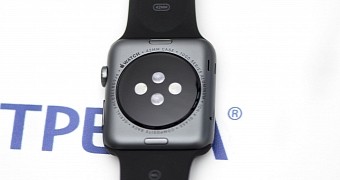This is not the first time, and certainly not the last, when Apple is being sued over claims that the company stole a certain technology, but there now seems to be a well-founded story around the case.
Biometrics firm Valencell has filed a lawsuit against Apple and Fitbit, claiming that some of their products are using its heart rate sensor without paying for a license.
The story is the same as in pretty much every IP infringement case: some companies are using a specific technology on their products, while a different firm claims that this technology is theirs and they should be paid should the products in question remain on the market.
Valencell claims its heart rate monitor is being used on products such as the Apple Watch, the Fitbit Charge HR, and the Fitbit Surge, all of which come with heart activity tracker capabilities.
Apple sneakily accessed tech whitepapers
Interestingly, Valencell explained in the court documents that it actually got in touch with Apple to negotiate a potential deal that would license the heart rate sensor to the Cupertino-based firm, but no agreement was reached. Prior to this, Valencell says, Apple asked some of its employees to access whitepapers that provided more information on its technology and published on its official site.
These documents were available with a registered account, the firm says, but Apple’s employees used fake credentials to access them. A total of 7 employees have already been identified, it adds, and they’re all working for Apple.
“In or around the summer of 2013, Valencell demonstrated a prototype PerformTek-Powered watch to approximately 15 Apple employees. The back of the watch included a heart-rate monitor that was substantially similar to the Apple Watch. One or more of the Apple employees in attendance was involved in the design and/or implementation of the Apple Watch,” the lawsuit papers found by AI explain.
Apple has not yet offered a statement on these accusations, but as mentioned above, the company has a long history of similar cases, so expect it to settle (or win) the lawsuit sometime in the next few years.

 14 DAY TRIAL //
14 DAY TRIAL //